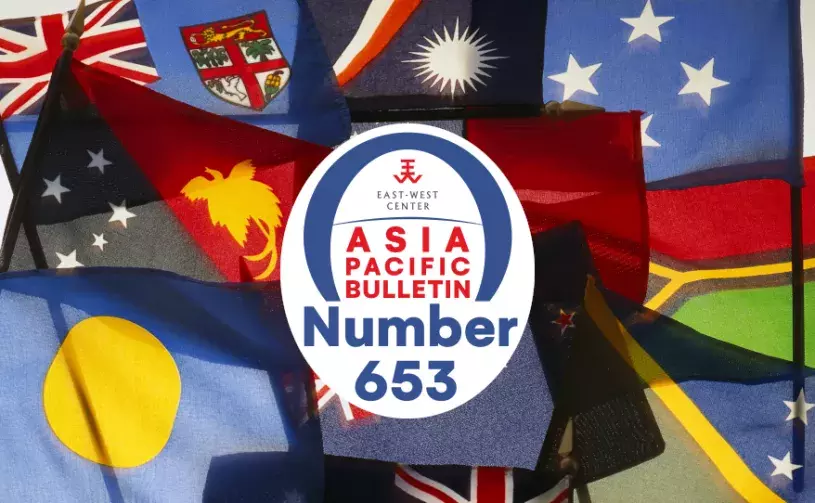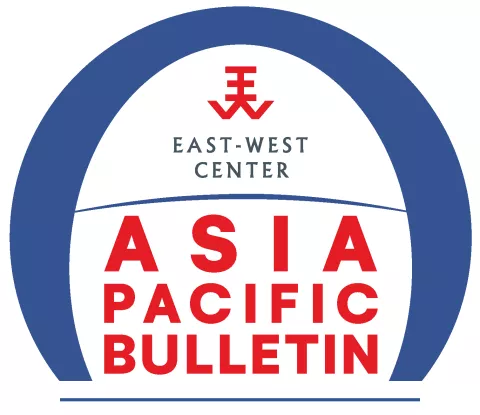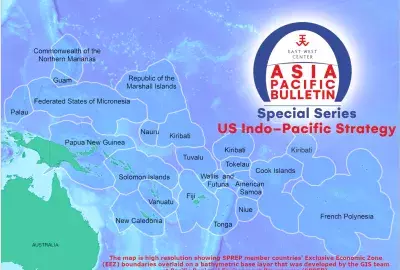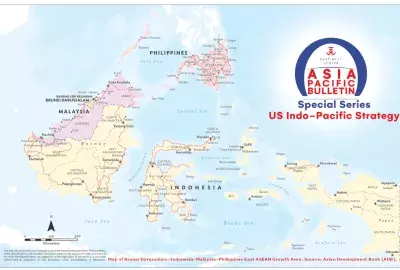Error message


| Angelo Paule and Alec Weiker, explain that while citizens from the three COFA countries—Palau, the Federated States of Micronesia, and the Republic of the Marshall Islands—can live and work visa-free in the United States, COFA migrants’ special “non-immigrant” status has complicated their access to federal benefits. |
| for additional titles in the Asia Pacific Bulletin |
The Biden-Harris Administration’s 2024 Department of the Interior (DOI) budget proposal supports passing the Compact Impact Fairness Act (CIFA). CIFA would restore federal benefits to migrants from three Pacific countries: Palau, the Federated States of Micronesia (FSM), and the Republic of the Marshall Islands (RMI). Support for CIFA is a welcome development for Compacts of Free Association (COFA) migrants and the US states and territories that host them. Yet, the budget proposal’s omission of funding support for host governments and uncertainty on implementation and prioritization for COFA migrants present acute issues that may linger for years ahead.
The Compact Impact Fairness Act
As part of separate COFA agreements, along with economic assistance exchanged for exclusive defense access, citizens from the three countries can live and work visa-free in the United States. Despite this, COFA migrants’ special “non-immigrant” status has complicated their access to federal benefits. A drafting mistake in the 1996 Personal Responsibility and Work Opportunity Reconciliation Act has led to COFA migrants losing access to most federal benefits like Medicaid, the Supplemental Nutrition Assistance Program (SNAP), and Temporary Assistance for Needy Families (TANF).
Without access to essential services such as Medicaid, COFA migrants in the US have had low rates of insurance coverage, increased uninsured emergency room visits, and higher mortality rates. These barriers are especially harsh on migrants from the RMI as US-conducted nuclear tests have led to ongoing health issues, manifesting in higher levels of chronic disease even among those currently in the United States. COFA migrants also suffer above-average poverty rates and face employment, housing, and education discrimination.
The implementing legislation of the original Compacts in 1986 expressed a desire to avoid “adverse consequences for the United States territories and commonwealths or the State of Hawaiʻi.” Subsequently, since 2004, the federal government has allotted compact impact funding to States and US territories, including Hawaiʻi, Guam, and the Commonwealth of the Northern Marianas Island, to help defray the costs of absorbing COFA migrants.
Starting in FY-2004, a $30 million Compact Impact appropriation was proportionally split among the eligible areas based on COFA migrant population share, with some additional appropriations between $3-5 million annually beginning in 2012. In 2018, Guam’s reported total Compact-related spending since 2004 reached nearly $1.37 billion, while it received only $244.8 million from the federal government.
After COFA migrants lost federal safety net access in 1996, some states, such as California, Washington, Oregon, and Hawai’i, provided ad-hoc healthcare coverage. In 2020, Congress restored COFA eligibility for Medicaid. Still, given the cost-sharing structure of Medicaid, state governments incur costs from COFA Medicaid recipients. To further restore federal program eligibility to COFA migrants, senators and representatives on both sides of the aisle re-introduced the CIFA in March 2023. The Act was initially proposed in 2021 but did not gain traction at the time. CIFA would provide eligibility to SNAP, TANF, Supplemental Security Income, and Social Block Grant federal programs without a five-year waiting requirement.
Hawaiʻi Representative Ed Case said, “It is unfair to expect states and localities like Hawaiʻi, Guam, Arkansas, and elsewhere... to shoulder hundreds of millions of dollars… for what are uniquely federal responsibilities…” Guam Delegate Moylan, in another statement, says the Bill would help “reduce the depletion of [Guam’s] resources.” CIFA, by advocating a more equitable distribution of federal and local responsibilities, has garnered bipartisan support.
An End to Compact Impact Funds?
While CIFA is a welcome measure, host governments and COFA migrant communities have questioned whether CIFA alone “casts the full net” of federal programs needed by COFA migrants. The DOI budget request supports the passage of CIFA, and the budget omits future Compact Impact funds. A recent statement by the Department of Interior puts the ball in Congress’ court regarding Compact Impact Funds. The Biden-Harris administration’s DOI sees eligibility for federal social safety net programs as “a long-term solution to the financial impacts of Compact migrants on state and territorial governments…” and any additional Compact Impact assistance “requires congressional action.”
Although CIFA would relieve burdens on host governments by providing COFA migrants with certain federal services, current federal programs would not fully address the sheer scale of Compact-related spending by these communities. According to Bobby Shringi, Moylan’s Chief of Staff, “There’s a lot not covered under the federal safety net, like education and public safety.” Educational services alone comprised around 56% of reported Compact Impact costs across Hawai’i, Guam, and CNMI in 2017.
Guam’s Governor, Lou Leon Guerrero, and Moylan have publicly pushed for Compact Impact funding through the next Compact’s duration. Leon Guerrero highlighted acute ways funding removal would impact the Government of Guam’s budget, such as paying for public school leases. Moylan’s efforts to garner congressional support for renewing Compact Impact funding are ongoing.
CIFA is Only One Step
COFA migrant stakeholders caution that passing CIFA is part of a broader battle. Jackson Soram, Chargé d'affaires at the Embassy of the Federated States of Micronesia, noted that “the challenge is not only at the federal level; it is also at the state levels,” he said. “Our hope is that the federal government can do more to bring the states into the fold and implement these federal legislations or, better yet, adhere to the spirit of the Compact.”
Even though Congress restored access to Medicaid in 2020, many COFA migrants still encounter challenges obtaining it. Too often, States fail to update their Medicaid eligibility guidelines. In other cases, poor infrastructure and a general lack of awareness regarding eligibility have prevented access.
Dr. April Brown, the co-founder of The Marshallese Education Initiative (MEI), an Arkansas-based non-profit promoting Marshallese awareness, shared these concerns. She noted that few state officials overseeing eligibility determinations know what COFA is: “Interpretation over the eligibility for assistance, even financial aid for students, varies from state to state.” Many federal agencies also lack COFA awareness: “Members of our staff who regularly travel out of the country are almost always stopped upon reentry and have to educate border officials as to why they do not need a visa or green card,” Brown wrote.
Benetick Kabua Maddison, the executive director of MEI, also noted that there needs to be more recognition and support of the Marshallese diaspora affected by US nuclear testing: “The ongoing consequences of the nuclear legacy, including its impact on Marshallese bodies and culture, recognizes no geopolitical boundaries.”
Looking ahead, Brown wrote, “We have concerns that after Compact negotiations conclude and foreign policy considerations regarding China are dealt with, that the Marshallese people… will once again be forgotten.”
A Way Forward
If CIFA becomes law, the federal government should ensure that state governments integrate changes into their policy handbooks and that eligibility information is translated into languages spoken by COFA migrants.
To sustain support for these communities, there must be an ongoing dialogue between the federal government, host governments, and diaspora communities disaggregated from foreign policy objectives.

| Angelo Paule and Alec Weiker, explain that while citizens from the three COFA countries—Palau, the Federated States of Micronesia, and the Republic of the Marshall Islands—can live and work visa-free in the United States, COFA migrants’ special “non-immigrant” status has complicated their access to federal benefits. |
| for additional titles in the Asia Pacific Bulletin |
The Biden-Harris Administration’s 2024 Department of the Interior (DOI) budget proposal supports passing the Compact Impact Fairness Act (CIFA). CIFA would restore federal benefits to migrants from three Pacific countries: Palau, the Federated States of Micronesia (FSM), and the Republic of the Marshall Islands (RMI). Support for CIFA is a welcome development for Compacts of Free Association (COFA) migrants and the US states and territories that host them. Yet, the budget proposal’s omission of funding support for host governments and uncertainty on implementation and prioritization for COFA migrants present acute issues that may linger for years ahead.
The Compact Impact Fairness Act
As part of separate COFA agreements, along with economic assistance exchanged for exclusive defense access, citizens from the three countries can live and work visa-free in the United States. Despite this, COFA migrants’ special “non-immigrant” status has complicated their access to federal benefits. A drafting mistake in the 1996 Personal Responsibility and Work Opportunity Reconciliation Act has led to COFA migrants losing access to most federal benefits like Medicaid, the Supplemental Nutrition Assistance Program (SNAP), and Temporary Assistance for Needy Families (TANF).
Without access to essential services such as Medicaid, COFA migrants in the US have had low rates of insurance coverage, increased uninsured emergency room visits, and higher mortality rates. These barriers are especially harsh on migrants from the RMI as US-conducted nuclear tests have led to ongoing health issues, manifesting in higher levels of chronic disease even among those currently in the United States. COFA migrants also suffer above-average poverty rates and face employment, housing, and education discrimination.
The implementing legislation of the original Compacts in 1986 expressed a desire to avoid “adverse consequences for the United States territories and commonwealths or the State of Hawaiʻi.” Subsequently, since 2004, the federal government has allotted compact impact funding to States and US territories, including Hawaiʻi, Guam, and the Commonwealth of the Northern Marianas Island, to help defray the costs of absorbing COFA migrants.
Starting in FY-2004, a $30 million Compact Impact appropriation was proportionally split among the eligible areas based on COFA migrant population share, with some additional appropriations between $3-5 million annually beginning in 2012. In 2018, Guam’s reported total Compact-related spending since 2004 reached nearly $1.37 billion, while it received only $244.8 million from the federal government.
After COFA migrants lost federal safety net access in 1996, some states, such as California, Washington, Oregon, and Hawai’i, provided ad-hoc healthcare coverage. In 2020, Congress restored COFA eligibility for Medicaid. Still, given the cost-sharing structure of Medicaid, state governments incur costs from COFA Medicaid recipients. To further restore federal program eligibility to COFA migrants, senators and representatives on both sides of the aisle re-introduced the CIFA in March 2023. The Act was initially proposed in 2021 but did not gain traction at the time. CIFA would provide eligibility to SNAP, TANF, Supplemental Security Income, and Social Block Grant federal programs without a five-year waiting requirement.
Hawaiʻi Representative Ed Case said, “It is unfair to expect states and localities like Hawaiʻi, Guam, Arkansas, and elsewhere... to shoulder hundreds of millions of dollars… for what are uniquely federal responsibilities…” Guam Delegate Moylan, in another statement, says the Bill would help “reduce the depletion of [Guam’s] resources.” CIFA, by advocating a more equitable distribution of federal and local responsibilities, has garnered bipartisan support.
An End to Compact Impact Funds?
While CIFA is a welcome measure, host governments and COFA migrant communities have questioned whether CIFA alone “casts the full net” of federal programs needed by COFA migrants. The DOI budget request supports the passage of CIFA, and the budget omits future Compact Impact funds. A recent statement by the Department of Interior puts the ball in Congress’ court regarding Compact Impact Funds. The Biden-Harris administration’s DOI sees eligibility for federal social safety net programs as “a long-term solution to the financial impacts of Compact migrants on state and territorial governments…” and any additional Compact Impact assistance “requires congressional action.”
Although CIFA would relieve burdens on host governments by providing COFA migrants with certain federal services, current federal programs would not fully address the sheer scale of Compact-related spending by these communities. According to Bobby Shringi, Moylan’s Chief of Staff, “There’s a lot not covered under the federal safety net, like education and public safety.” Educational services alone comprised around 56% of reported Compact Impact costs across Hawai’i, Guam, and CNMI in 2017.
Guam’s Governor, Lou Leon Guerrero, and Moylan have publicly pushed for Compact Impact funding through the next Compact’s duration. Leon Guerrero highlighted acute ways funding removal would impact the Government of Guam’s budget, such as paying for public school leases. Moylan’s efforts to garner congressional support for renewing Compact Impact funding are ongoing.
CIFA is Only One Step
COFA migrant stakeholders caution that passing CIFA is part of a broader battle. Jackson Soram, Chargé d'affaires at the Embassy of the Federated States of Micronesia, noted that “the challenge is not only at the federal level; it is also at the state levels,” he said. “Our hope is that the federal government can do more to bring the states into the fold and implement these federal legislations or, better yet, adhere to the spirit of the Compact.”
Even though Congress restored access to Medicaid in 2020, many COFA migrants still encounter challenges obtaining it. Too often, States fail to update their Medicaid eligibility guidelines. In other cases, poor infrastructure and a general lack of awareness regarding eligibility have prevented access.
Dr. April Brown, the co-founder of The Marshallese Education Initiative (MEI), an Arkansas-based non-profit promoting Marshallese awareness, shared these concerns. She noted that few state officials overseeing eligibility determinations know what COFA is: “Interpretation over the eligibility for assistance, even financial aid for students, varies from state to state.” Many federal agencies also lack COFA awareness: “Members of our staff who regularly travel out of the country are almost always stopped upon reentry and have to educate border officials as to why they do not need a visa or green card,” Brown wrote.
Benetick Kabua Maddison, the executive director of MEI, also noted that there needs to be more recognition and support of the Marshallese diaspora affected by US nuclear testing: “The ongoing consequences of the nuclear legacy, including its impact on Marshallese bodies and culture, recognizes no geopolitical boundaries.”
Looking ahead, Brown wrote, “We have concerns that after Compact negotiations conclude and foreign policy considerations regarding China are dealt with, that the Marshallese people… will once again be forgotten.”
A Way Forward
If CIFA becomes law, the federal government should ensure that state governments integrate changes into their policy handbooks and that eligibility information is translated into languages spoken by COFA migrants.
To sustain support for these communities, there must be an ongoing dialogue between the federal government, host governments, and diaspora communities disaggregated from foreign policy objectives.







